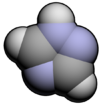1,2,4-三唑
化合物
1,2,4-三唑(作为配体时简称Htrz)是三唑的异构体之一,化学式 C2H3N3,有一个由两个碳原子和三个氮原子组成的五元环。1,2,4-三唑及其衍生物有多种应用。[1]
| 1,2,4-三唑 | |||
|---|---|---|---|
| |||
| IUPAC名 1H-1,2,4-Triazole | |||
| 识别 | |||
| CAS号 | 288-88-0 | ||
| PubChem | 9257 | ||
| ChemSpider | 8900 | ||
| SMILES |
| ||
| InChI |
| ||
| InChIKey | NSPMIYGKQJPBQR-UHFFFAOYAZ | ||
| ChEBI | 46077 | ||
| 性质 | |||
| 化学式 | C2H3N3 | ||
| 摩尔质量 | 69.07 g·mol−1 | ||
| 外观 | 白色固体 | ||
| 密度 | 1.439 g/cm3 | ||
| 熔点 | 120—121 °C(248—250 °F;393—394 K) | ||
| 沸点 | 260 °C(533 K) | ||
| 溶解性(水) | 非常易溶 | ||
| pKa | 10、3 | ||
| pKb | 11、8 | ||
| 相关物质 | |||
| 相关化学品 | 1,2,3-三唑 咪唑 | ||
| 若非注明,所有数据均出自标准状态(25 ℃,100 kPa)下。 | |||
结构和性质
编辑1,2,4-三唑是一种平面型分子。它的C-N和N-N键都在132至136皮米的范围内,与芳香性一致。[2]尽管可以设想1,2,4-三唑有两种互变异构体,但实际上只有一种存在。
1,2,4-三唑是两性的,在水溶液中可以N-质子化和去质子化。1,2,4-三唑钅翁离子 (C2N3H4+) 的 pKa为2.45,而中性1,2,4-三唑的pKa 为10.26。[3]
制备和存在
编辑1,2,4-三唑类可以通过艾因霍恩-布伦纳反应或佩利扎里反应制备。没有取代基的1,2,4-三唑可以由硫代氨基脲被甲酸酰化,然后把产物1-甲酰基-3-硫代氨基脲环化成1,2,4-三唑-3(5)-硫醇,最后用硝酸或过氧化氢氧化,产生1,2,4-三唑。[5]
1,2,4-三唑类化合物在多种药物中均有使用。[6][7]一些值得注意的三唑类包括抗真菌药氟康唑和伊曲康唑。[8]1,2,4-三唑阴离子在配位化学中是一种常见的桥接配体。[9]
参考资料
编辑- ^ Potts K. T. The Chemistry of 1,2,4-Triazoles.. Chemical Reviews. 1961, 61 (2): 87–127. doi:10.1021/cr60210a001.
- ^ Jeffrey, G. A.; Ruble, J. R.; Yates, J. H. Neutron diffraction at 15 and 120 K and ab initio molecular-orbital studies of the molecular structure of 1,2,4-triazole. Acta Crystallographica Section B Structural Science. 1983, 39 (3): 388–394. doi:10.1107/S010876818300258X.
- ^ Garratt, Peter J. 1,2,4-Triazoles. Comprehensive Heterocyclic Chemistry II. 1996: 127–163. ISBN 9780080965185. doi:10.1016/B978-008096518-5.00080-0.
- ^ Grosjean, Arnaud; Négrier, Philippe; Bordet, Pierre; Etrillard, Céline; Mondieig, Denise; Pechev, Stanislav; Lebraud, Eric; Létard, Jean-François; Guionneau, Philippe. Crystal Structures and Spin Crossover in the Polymeric Material [Fe(HTRZ)2(TRZ)](BF4) Including Coherent-Domain Size Reduction Effects (PDF). European Journal of Inorganic Chemistry. 2013, 2013 (5–6): 796–802 [2021-10-11]. doi:10.1002/ejic.201201121. (原始内容 (PDF)存档于2021-11-05).
- ^ C. Ainsworth. 1,2,4-Triazole. Organic Syntheses. 1960, 40: 99. doi:10.15227/orgsyn.040.0099.
- ^ Keri, Rangappa S.; Patil, Siddappa A.; Budagumpi, Srinivasa; Nagaraja, Bhari Mallanna. Triazole: A Promising Antitubercular Agent. Chemical Biology & Drug Design. 2015, 86 (4): 410–423. PMID 25643871. doi:10.1111/cbdd.12527.
- ^ Kaur, Ramandeep; Ranjan Dwivedi, Ashish; Kumar, Bhupinder; Kumar, Vinod. Recent Developments on 1,2,4-Triazole Nucleus in Anticancer Compounds: A Review. Anti-Cancer Agents in Medicinal Chemistry. 2016, 16 (4): 465–489. PMID 26286663. doi:10.2174/1871520615666150819121106.
- ^ Kathiravan, Muthu K.; Salake, Amol B.; Chothe, Aparna S.; Dudhe, Prashik B.; Watode, Rahul P.; Mukta, Maheshwar S.; Gadhwe, Sandeep. The biology and chemistry of antifungal agents: A review. Bioorganic & Medicinal Chemistry. 2012, 20 (19): 5678–5698. PMID 22902032. doi:10.1016/j.bmc.2012.04.045.
- ^ Haasnoot, Jaap G. Mononuclear, oligonuclear and polynuclear metal coordination compounds with 1,2,4-triazole derivatives as ligands. Coordination Chemistry Reviews. 2000,. 200-202: 131–185. doi:10.1016/S0010-8545(00)00266-6.

